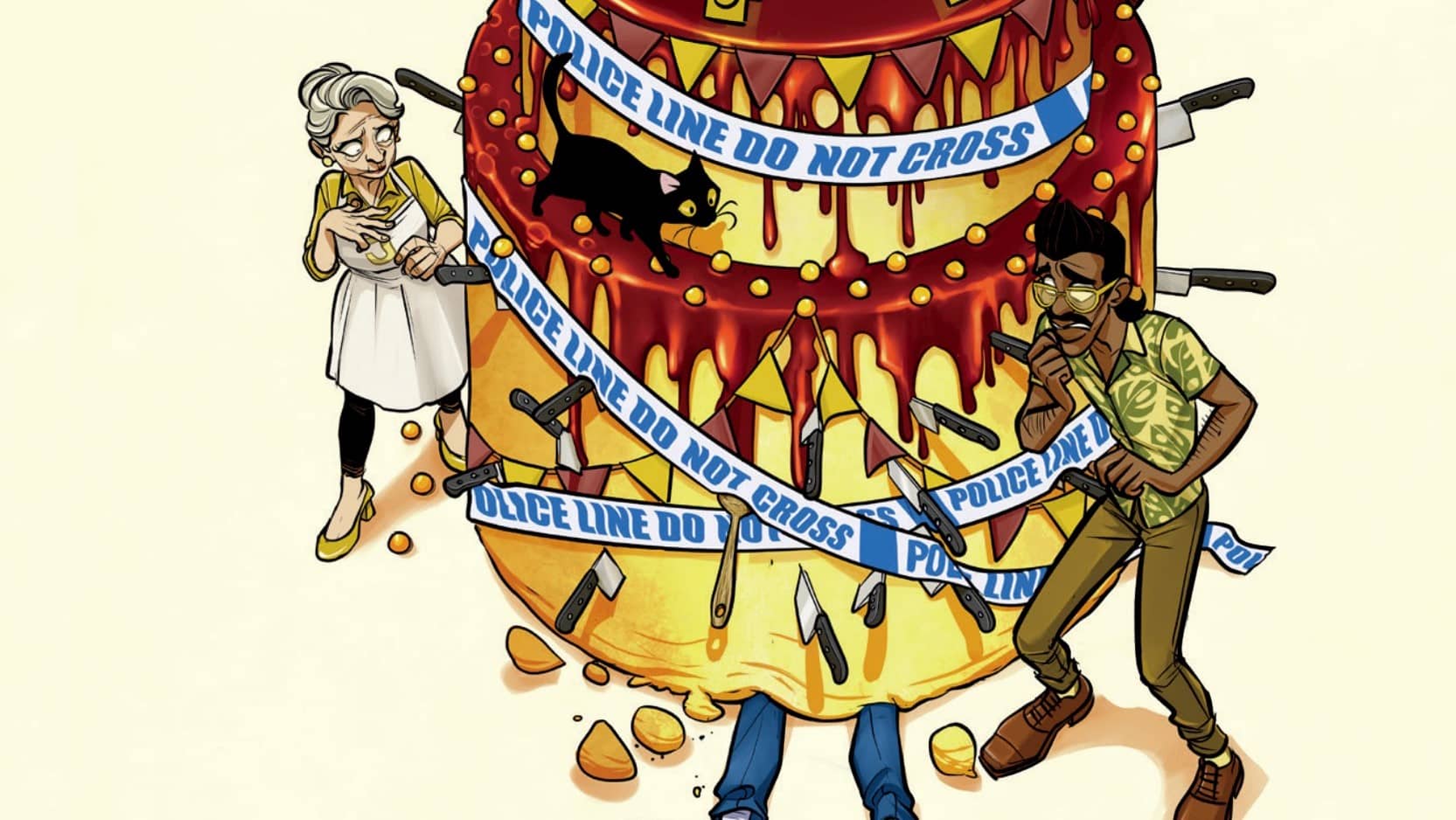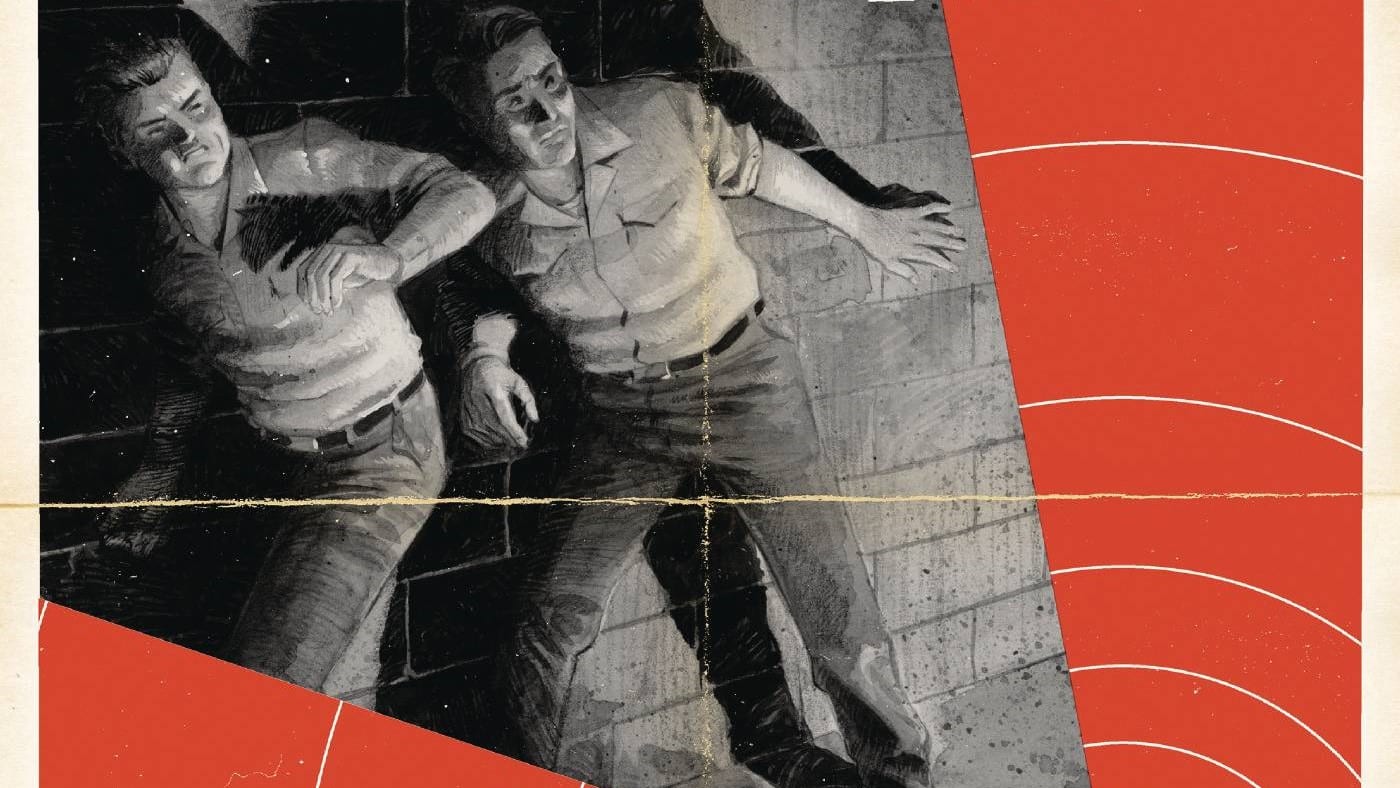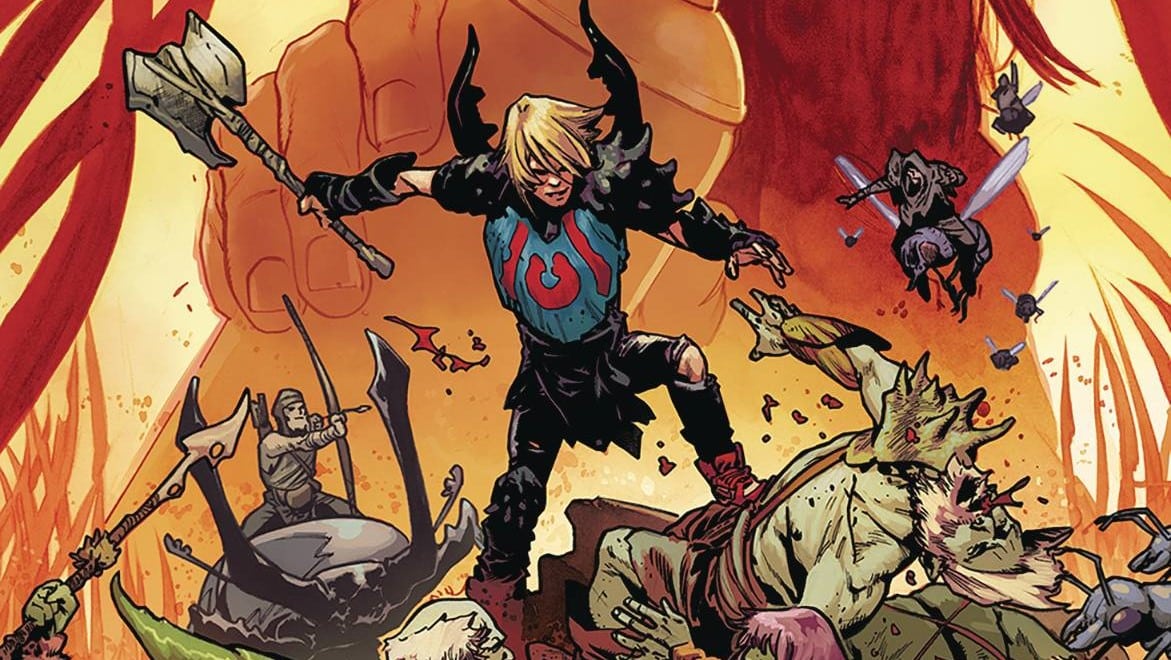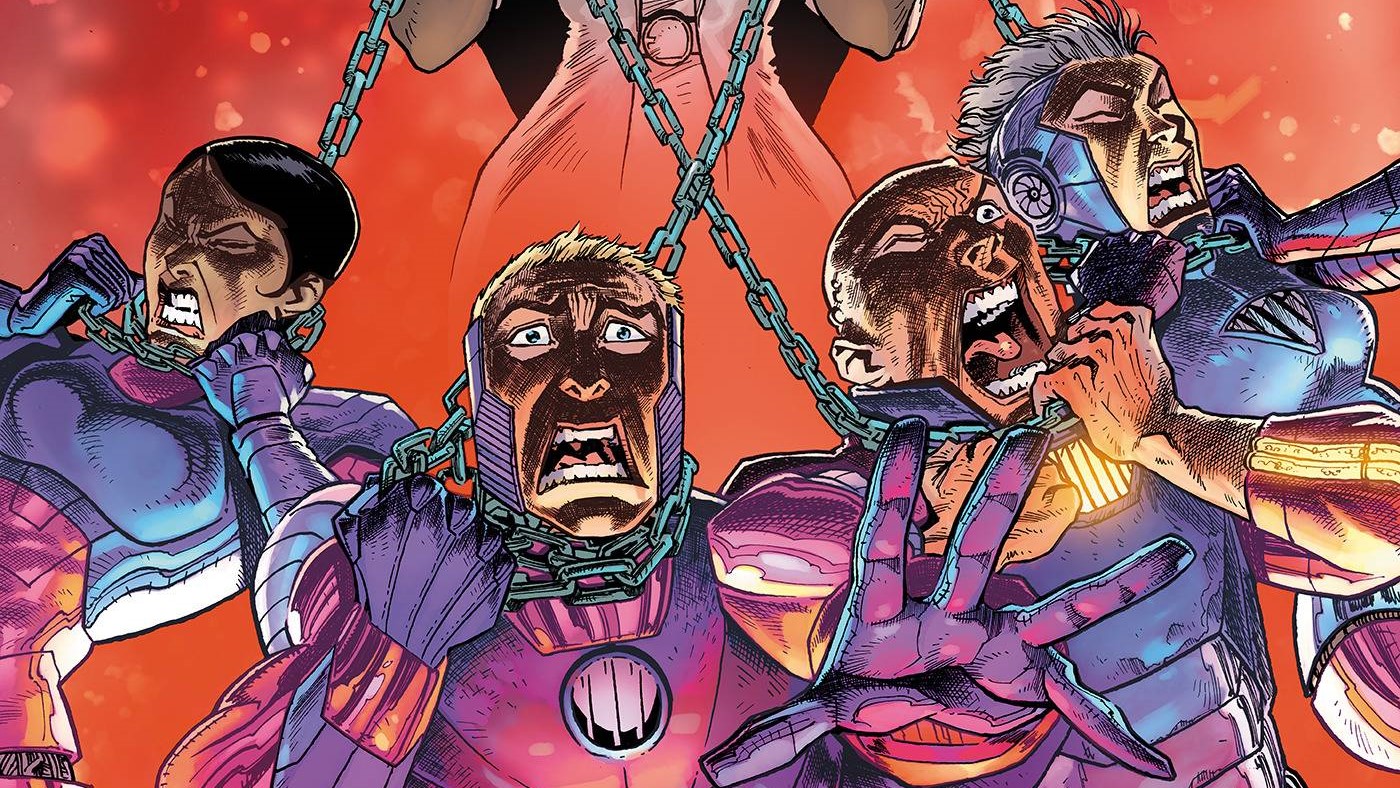Roy is drifting closer to the Red Planet and his ultimate fate, but he still finds himself tied to his past in Traveling to Mars #4, written by Mark Russell, drawn by Roberto “Dakar” Meli, colored by Chiara Di Francia, lettered by Mattia Gentili and published by Ablaze.
If you can’t stand the heat in the kitchen, at least try not to die in The Great British Bump-Off #1, written by John Allison, drawn by Max Sarin, colored by Sammy Borras, lettered by Jim Campbell and published by Dark Horse.
In space, everyone can hear you shit. Especially when the poop jokes aren’t even funny. Space Job #1 is written by David A. Goodman, drawn by Álvaro Sarraseca, colored by Jordi Escuin Llorach, lettered by Mauro Mantella and published by Dark Horse.
Will Nevin: Ian, you ever heard of the sacroiliac joint? Why am I even asking? You’re not a real doctor either. Anyway, mine is inflamed, and I’m cranky and probably taking it out on one of the books this week. How are you?
Ian Gregory: I went to see the Cubs, and the Cubs won. Therefore I’m in a great mood. No, I don’t care that they’ve lost a bunch since I was there. If I’m not there to certify the results in person, they don’t matter. I’ll do my best to counterbalance your old-man grumpiness.
Will: Cubs won! Cubs won! Cubs won! Good for them. And for you.
But I’m still grumbly.
Traveling to Mars #4: Inside, Outside of Roy’s Head, It’s All Bad

Will: Our last issue — in this newly minted Eisner-nominated series — moved a bit slowly, but that is not the case in this one, which had some surprisingly high stakes. It might just be the meds I’m hopped up on, but as one of our little rovers floated out in space to presumably die alone, I felt bad feelings, Ian! One of the virtues of a series so content to slowly build and explore this one main character is that when stuff happens, it matters.
Ian: We spent a lot of time watching Roy build up a rapport with those little guys, so it was almost heartbreaking to watch him fall off into the deep of space. Roy treating the robots with kindness and dignity has been reciprocated, and the Trubond Seal and Paste team treating Roy with duplicity has in itself been reciprocated (though I will admit to some suspicion that Candy might be dead, and the beef company is lying to cover their asses). There’s a kind of moral simplicity in this book that I find almost refreshing, but also just a little frustrating. Roy tells us over and over again that he’s screwed up, that he’s never done anything, and so on. But he’s also a little too blameless in his faults, and I find myself wishing there was more to his character than regret.
Will: I am nothing *but* regret, so maybe that’s why I like this book so much. I’m glad we didn’t spend much time building up Roy’s reunion with Candy only for it not to happen — and credit to the creative team for laying out the reveal in such a way to telegraph to readers that *something* was up. I don’t know if that reunion will ever happen, but this little chapter in the story served to let us know (if we didn’t already) that there are no heroes in this story. Not anyone left on Earth. Not Roy, who’s just a sad dying man trying to do the best with what he has left.
Actually, I take that back — maybe the rovers are heroes.
Ian: I’m glad that we stepped out of Roy’s head for a bit this issue. Last issue was almost too introspective, with all the flashbacks and monologues about the nature of the universe. I think the corporate rat race for Mars that makes up the setting is really compelling. Roy’s depersonalization, his reduction to a corporate tool, is just as much an important part of this story as his failures in his personal life. I think that by focusing on Roy’s past so much, we’ve kind of forgotten the role that capitalism has played in Roy’s despondency, both in his pre-space life and now that he’s trapped on a one-way trip.
Will: As usual, the art here is top notch. The two-page spread of the galaxy just after the Big Bang was nothing fancy, but it still looked great.
Ian: I loved it, but I still have some concerns about this therapist who brought about that page. Is this guy even licensed? I started to think it was a gag that Roy would mention something innocuous and the therapist would go off on a philosophical tangent. Where did they find this guy?
The Great British Bump-Off #1: A Little Fast and Loose

Will: A little appetizer for us, Ian, before we get to the disappointment disaster of the week, this story — as far as I can remember — was sold as what my other partner Matt likes to call the “play fair” mystery, something that we as readers can solve as we explore the story. We certainly have a lot of suspects (conveniently named and labeled at the start of the issue, thank you!), but I don’t know if we have any clues as to which contestant is trying to murder their way to the top (?) of the UK Bakery Tent. (Why we’re in a tent, I do not know. I’ve also never watched any of these cooking shows. Unless we’re counting the original Iron Chef, in which case, I have.) That said, it’s also pretty early in the story.
Ian: Lots of characters in this murder mystery — indeed, too many characters. If they kill about three or four more of them before the murderer is revealed, I think things would get manageable. The characters are at least pretty distinctive, but I can’t help but feel like the mystery here is undermined by the pacing. The scene changes felt abrupt, and I felt as though the story rushed past establishing the characters (“We’ve met and now we’re all best friends! Time to solve a mystery!”) to get to the baking tent scene. A good murder, in my opinion, should take place about a sixth of the way through a story, if not even later. I think I would have liked our fellow to be “killed” (in fact, he’s in urgent care, not actually dead) at the end of the issue rather than a few pages in.
Will: What did you make of the tone here? We’re clearly going for laughs, and I appreciate those intentions after we slogged through Rogues’ Gallery, but it does seem to lessen the stakes when no one is playing it straight. There has to be something to push against, right? Benoit Blanc is an absurd character, but he is incredibly serious about what he does. I dunno, I guess something just seems off here.
Ian: There’s a reason all the great detectives work in pairs. Archie Goodwin can make wry observations and crack wise all day long because Nero Wolfe doesn’t have time for any frippery. Holmes can be offensive and abrupt because Watson will always stop and take time to explain things to the reader. In this book, the main character is bombastic and makes lots of jokes, so her sidekicks should take things seriously, except that they’re also making jokes. This isn’t the drill store, Will. We can’t all be doing bits.
Will: ZINGER. Maybe it was the art that took it over the top for me. Am I just a dour motherfucker? Is that the problem here?
Ian: While the art didn’t exactly inspire me, I thought it was fine in a middle-grade mystery sort of way. Some of the visual jokes landed, too — the Tor browser panel is funny, and the Altamont Concert Cake is great. I think my frustration here is that the jokes were so fast and heavy that the murder mystery itself feels pushed out of the story.
Space Job #1: Fuckin’ Fire This Thing Out an Airlock

Will: Hey, another book I have to apologize for picking! David A. Goodman has a resume as impressive as you’ll ever see in comics: He’s written for The Golden Girls, Futurama, Star Trek: Enterprise and other television series. Executive producer for Family Guy, American Dad and The Orville. Hell, he’s even the president of the Writers Guild of America West.
But this? This book stinks. The art is bland, the plot is nonsensical and not one of the fuckin’ jokes lands. Not a one. Oh boy, the chef’s assistant on one ship got promoted to first officer on another! And he’s going to be a dick about everything. But wait, the ship is so shitty that when he gets there, the captain’s chair explodes and kills him! Hold on, though, the captain says, “On my ship, we’re more positive than that. I know his condition will improve.” What? Huh?
I didn’t even laugh at the shit joke. This was grim.
Again, I’m sorry.
Ian: I think, as far as I can tell, that the joke was meant to be about how in Star Trek, a show I’ve heard you have some slight familiarity with, characters come back from all sorts of nonsensical situations none the worse for wear. Or maybe it’s just about bad managers with impossible expectations. Or maybe it’s about nothing at all. I don’t know, and I don’t really get it.
The art bothers me, too. It’s like all the edges have been filed off. Everything is perfectly geometrical, which I suppose is meant to reflect the sterility of the future, but really all it makes me think is that Sarraseca forgot to finish the backgrounds. The characters are fine but bland. Nothing here is memorable in a visual sense.
Will: Down Periscope is an underrated ’90s comedy gem (note that I didn’t ask whether you have seen it — I just assume things at this point) that works because Kelsey Grammer’s submarine captain is an eccentric, fun-loving weirdo, yes, but at his core, he’s deeply competent. You can’t say that for everyone on his boat, but he truly cares about his crew, and he’s a great leader. These fuckers on the George H.W. Bush? None of them seem good or smart or able to do anything. So why should we care?
Ian: Do you know what jumped out to me here as strange? The fact that all of a sudden, we’re getting cutaway interviews like this is The Office. This feels like a TV pitch that never went anywhere because Trek already has Lower Decks. I think this is failing to hit any tone in particular. It sets itself up like a comedy, and almost has a decent joke (that your average Trek ship is a total deathtrap) but bungles it. Oh well, but rather than recover, it dives into, frankly, boring interpersonal drama between a bunch of characters who all seem pretty annoying. I feel like it needed to commit one way or another: a comedy series with fun observations about the genre, or a drama series about how living on a small spaceship for years at a time would lead to festering interpersonal conflict.
Will: Was there anything good about this? Maybe the fact it wasn’t longer?
Ian: I liked the series of lines where the ship’s physician says the marriage counselor thinks he might be having an affair, then reveals that due to short-staffing, she’s the marriage counselor. Good premise for the joke, but I think the execution robs it of any impact.
Will: You know, that was the closest thing to a funny bit we got — if that had been at the beginning (and if *anything* else had landed), maybe this wouldn’t have been so terrible.
Does This Smell OK?
- Sound Effects Watch: Though it takes place off-screen, we get a great SLICE effect rendered in dripping blood as someone cuts themselves with a knife in The Great British Bump-Off.
- Rapid fire questions:
- What’s one robot that actually deserves to die?
- Will: Lore. What an asshole.
- Ian: Me and my friends would have killed those robot police dogs with hammers, I can tell you that much.
- Will: ACAB applies to all dogs as well — living or robotic.
- Your favorite baked treat?
- Will: Red velvet cake. Specifically, my wife’s.
- Ian: Brownies. I’m simple.
- Favorite Seth MacFarlane property?
- Will: Hands down, American Dad. All-time show right there. But The Orville can fuck right off. I know a Seth MacFarlane vanity project when I see one.
- Ian: I have seen none of his shows, outside of short clips that get randomly circulated online.
- Will: How do you live 13 or 14 or however many years old you are and not even see one episode of Family Guy? Good lord.
- What’s one robot that actually deserves to die?
- Am I sad for the Chinese woman who got hit with a $6,500 (U.S.) bill for repeatedly scamming a Guizhou province buffet for take home food? No, I am not. No doggie bags at the buffet. There are rules. We live in a society.
- Next person who “sneaks bagged salad leftovers into baked goods” on me is getting shivved.







